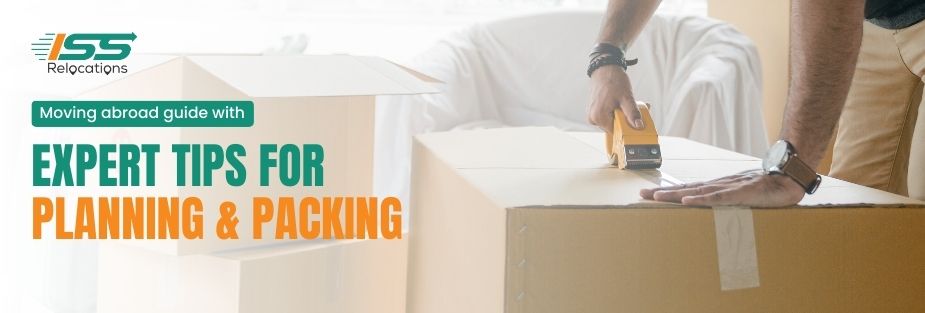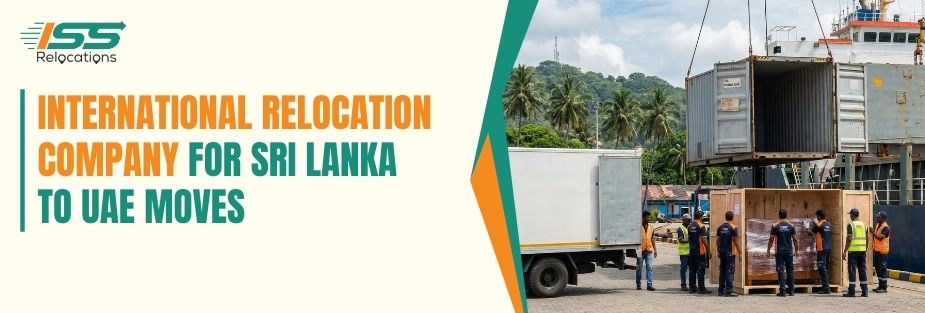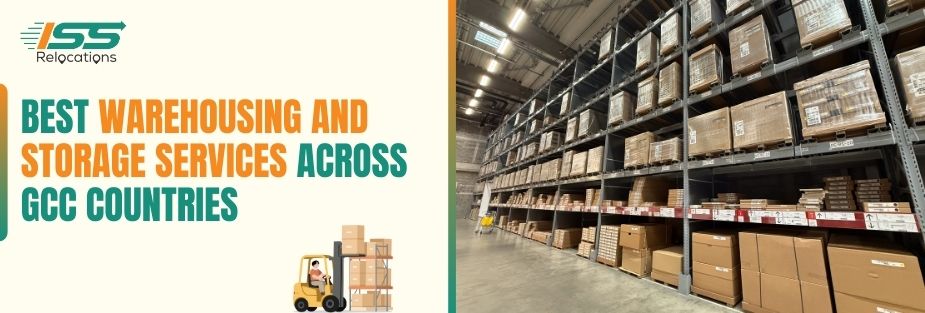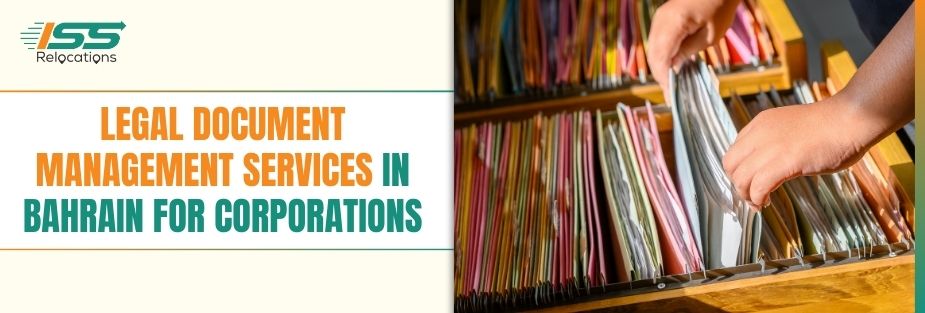
Moving Abroad Guide with Expert Tips for Planning & Packing
A well-structured moving abroad guide can make the difference between a smooth transition and an overwhelming relocation experience. Whether you’re chasing a career opportunity, planning a new chapter with your family, or simply exploring life in a different culture, international relocation is a significant life change that demands preparation on every front.
Leaving your home country means more than packing up boxes. You’re stepping into unfamiliar systems—from healthcare and housing to schooling and transportation. This is where most first-time expats realize how essential it is to work from a reliable expat relocation guide tailored for real-world challenges. The emotional, logistical, and legal hurdles can be intense if not approached with a clear strategy.
At ISS Relocations, we’ve guided thousands of individuals and families through international moves with precision and care. Our clients frequently tell us how much simpler the journey became once they understood how to break it down using a structured moving abroad guide. That’s exactly what this guide aims to offer.
In the sections that follow, you’ll find a comprehensive relocation planning guide packed with real insights, timelines, and expert-backed steps. From documentation to budgeting and culture shock to packing tips, we’ll walk you through the entire emigration how-to process. By the end, you’ll have a solid understanding of what it takes to move confidently, safely, and smartly into your new life abroad.
Expert Tips for Packing!
Planning an international move? Access our expert guide for seamless packing and relocation tips today.
Moving Abroad Guide – Your Step-by-Step Blueprint
Every successful relocation begins with a plan. This moving abroad guide is designed to provide a detailed roadmap that addresses the early phases of international moving, giving you clarity and control over what could otherwise be a chaotic process.
Research Your Destination Thoroughly
Before you book tickets or hire movers, start with deep research into your new destination. A well-prepared moving abroad guide should help you understand the cultural landscape, local laws, and economic climate, which all make a huge impact on your adaptation process.
Healthcare systems vary dramatically across countries. Some nations offer public healthcare to residents, while others require private insurance from day one. Knowing what applies to your situation can help avoid costly delays in accessing medical care once you arrive.
Housing is another critical aspect. Any reliable moving abroad guide will stress the importance of learning about average rental costs, tenant rights, and the paperwork required to sign a lease. ISS Relocations often supports clients with destination services that include home-finding assistance, which can be especially helpful in high-demand cities.
If you’re moving with children, look into local schooling options early. Public, private, and international schools all come with different processes and timelines. A reliable expat relocation guide will always recommend initiating school admissions 6–12 months before the move.
Budgeting and Financial Planning for the Move
A realistic financial plan is a key part of any moving abroad guide. International moves can incur unexpected costs, from customs fees and shipping insurance to emergency expenses and setup costs in your new home.
Start with a detailed budget that includes:
- Visas and legal documentation fees
- International shipping or air freight charges
- Temporary accommodation upon arrival
- Insurance (health, property, and travel)
- Local transportation costs
- Currency exchange and banking fees
Setting up a local bank account can take time, depending on your destination. A moving abroad guide often suggests speaking with your bank about international branches or partnerships. ISS Relocations regularly assists clients with financial orientation and partner banking services to simplify this process.
Also consider the impact of currency fluctuations on your savings or income. Countries with volatile exchange rates could affect your long-term financial stability. A good emigration how-to strategy should include a currency hedging plan or at least a forecast to prepare you for future costs.
Timing is Everything: When and How to Start Planning
One of the most overlooked parts of any moving abroad guide is starting the process early enough. Ideally, planning for an international move should begin at least six months in advance. This gives you enough time to sort documents, notify institutions, and coordinate logistics.
Begin with passports and visas. Renew your passport if it’s set to expire within six months of your intended move date. Then, review visa requirements for your destination. Some visas can take weeks—or even months—to process.
Book moving services early, especially if you’re moving during peak seasons. A moving abroad guide will recommend this approach to avoid last-minute costs. ISS Relocations offers flexible international moving timelines, including consolidated shipments and full-container options, so you’re never boxed into a rigid schedule.
Use the first three months to downsize your belongings, finalize housing arrangements, and notify employers, schools, or landlords. The next two months should focus on packing, health checkups, and utility arrangements. Your final month will be dedicated to goodbyes, final documentation, and travel prep.
Following a carefully sequenced moving abroad guide ensures nothing slips through the cracks. With structure, you’ll feel more confident navigating the challenges of relocation and more excited to start your new life abroad.
Relocation Planning Guide – Avoiding Costly Mistakes
Even with the best intentions, international moves often go off track due to overlooked details. A relocation planning guide isn’t just about logistics—it’s about foreseeing complications before they happen. From missing documents to underestimating customs delays, the margin for error can be slim. That’s why it’s critical to build your process on informed decision-making, not just good guesses.
Create a Comprehensive Moving Checklist
Success begins with a clearly structured checklist. While every move is unique, there are common phases that every relocating individual or family goes through. Begin by dividing tasks into three timeframes: pre-move, mid-move, and post-move. Each phase should have specific goals, deadlines, and action points.
A solid moving abroad guide will always recommend breaking down complex tasks. For example, “get legal paperwork in order” might sound simple, but it includes visa applications, notarizations, apostilles, and translation services. Treat each of these as separate tasks to ensure nothing gets overlooked.
Creating a timeline also keeps your relocation efforts organized. Mark key dates for shipping pickups, lease terminations, visa appointments, and medical exams. Remember, some embassies book out weeks in advance, so time-sensitive actions should be prioritized.
Work with Trusted International Movers Like ISS Relocations
Choosing the right moving partner is one of the most important decisions you’ll make. A dependable moving abroad guide emphasizes working with experienced professionals like ISS Relocations, who eliminate uncertainty at every step. From customs clearance to fragile item handling, professional movers manage what you can’t afford to get wrong.
Unlike generic providers, companies specializing in international relocation understand the nuances of documentation, port procedures, and overseas coordination. A reputable moving service can provide real-time updates, transparent tracking, and insurance tailored to international shipments.
The value of a partner who understands the moving abroad guide framework cannot be overstated. While it’s tempting to cut corners by hiring budget movers, this often results in delays, damage, or even loss. With ISS Relocations, clients gain peace of mind through customized services and end-to-end coordination—making the entire relocation smoother and more predictable.
Secure Important Documents Early
Paperwork is often the biggest bottleneck in international moves. A moving abroad guide will highlight how incomplete or delayed documents can ground your entire relocation plan. Your checklist should include gathering essential paperwork well in advance.
Start with identity and travel documents like passports, visas, and residence permits. Next, include academic records, employment contracts, birth and marriage certificates, and medical histories. Countries often require certified copies or translations, which can take time to obtain.
Healthcare-related records—like immunization histories or chronic illness documentation—are particularly important if you’re moving to a country with strict medical regulations. A dependable moving abroad guide should also include digital backups of all documents in encrypted cloud storage for quick access.
By staying proactive and detail-oriented, you can reduce the stress and risk of last-minute issues. ISS Relocations offers pre-move documentation support to ensure you stay ahead of administrative hurdles, avoiding common delays and costly mistakes.
Expat Relocation Guide to Packing Like a Pro
Packing for a new country isn’t just about organizing your belongings—it’s about making strategic decisions that will affect your comfort, finances, and timeline once you arrive. Any effective moving abroad guide will dedicate a large portion to smart packing techniques, especially if you’re shipping items internationally or facing customs limitations.
Decluttering Before You Pack
The first rule of international packing in any moving abroad guide is simple: don’t take everything. The more you move, the higher the cost—and the greater the chance of complications. Start your packing process by reviewing every category of belongings: clothes, electronics, documents, furniture, and keepsakes.
An expat relocation guide always advises decluttering before attempting to pack. This is the best time to sell unused furniture, donate excess clothes, and recycle outdated electronics. Not only does this cut down on volume, but it also helps reset your mindset for the minimalist lifestyle that often comes with moving abroad.
People often underestimate how different their new home will be. A thorough moving abroad guide will advise checking voltage compatibility and room layouts early. Your appliances may not work with local voltage, and your furniture may not fit smaller international layouts. Use this time to reassess what’s essential and what’s replaceable.
Decluttering is also psychologically freeing. You’re not just packing boxes—you’re preparing for a new identity in a different country. A thoughtful relocation planning guide will always emphasize emotional preparation alongside practical organization.
Essentials to Bring When Moving Abroad
Once you’ve narrowed down your belongings, a moving abroad guide suggests packing with purpose. Essentials vary depending on your destination, but some items are universally important.
Start with all necessary documentation, including physical and digital copies. You should also pack at least one week’s worth of clothing appropriate to the local climate, especially if you’re shipping your main luggage separately.
Medication should be brought in original packaging with prescriptions, particularly if you’re moving to countries with strict pharmaceutical laws. Electronics like laptops, mobile phones, and chargers should be hand-carried to avoid loss or damage in transit.
An effective moving abroad guide will also recommend comfort items—small, personal objects that help you settle emotionally. Familiar items like photos, favorite books, or even your pillow can offer a sense of home during the initial adjustment period.
ISS Relocations regularly advises clients on what to bring and what to leave behind. Their expert consultants evaluate your lifestyle, family needs, and destination conditions to create a custom packing plan that reduces stress and increases efficiency.
Packing for International Shipping vs. Air Travel
A moving abroad guide explains how packing strategies differ based on how your belongings are transported. Air travel luggage is limited by airline restrictions, so it’s reserved for must-haves. On the other hand, international shipping allows for a much larger volume but comes with customs considerations and delivery delays.
When packing for air travel, focus on immediacy. Think in terms of 7–14 days: clothes, toiletries, medication, work essentials, and critical paperwork. It’s best to assume you may not receive your shipped items right away.
For shipping, items should be packed securely using moisture-resistant materials and labeled with detailed inventories. A moving abroad guide and emigration how-to checklist should include customs declarations and packaging that meets international regulations. Failure to comply can result in expensive delays or confiscation.
A specialized mover like ISS Relocations provides customized packaging, labeling, and customs support for both air and sea freight. Their team ensures your belongings not only arrive safely but also pass through international borders without incident—something no generic checklist can guarantee.
A smart packing strategy goes beyond materials and containers. It’s about understanding timelines, regulations, and emotional needs. That’s why every effective moving abroad guide includes expert guidance, and why ISS Relocations is trusted by expats worldwide.
Moving Overseas Tips for a Smooth Transition
Once your move is underway, the journey doesn’t stop at the airport or shipping terminal. A smooth relocation is not just about transportation—it’s about settling into a new way of life with confidence and clarity. This section of the moving abroad guide focuses on what happens after you arrive, and how to navigate those critical first weeks in your new home.
What to Do Right After You Arrive
The first 24 to 72 hours in your destination country are often overwhelming. A expert moving abroad guide helps prepare you for navigating a foreign language, figuring out public transport, and managing unfamiliar routines. That’s where early, deliberate action becomes essential.
Registering with local authorities is often a legal requirement. In many countries, you must inform the local municipality or immigration office within a few days of arrival. Your expat relocation guide should include a step-by-step list of such country-specific formalities so you don’t miss important deadlines.
Next, set up your immediate needs—mobile service, internet, and basic groceries. It’s also advisable to visit the nearest medical facility to understand how emergency services work in your new area. The moving abroad guide recommends preparing this in advance by identifying essential service providers before you even land.
While adjusting to your new surroundings, try to track all your post-arrival tasks just as you did with pre-move planning. This helps avoid getting lost in the excitement or stress of the transition.
Adjusting to a New Culture and Environment
Culture shock is real. It doesn’t matter how prepared you think you are—adjusting to a new cultural setting takes time, patience, and a willingness to unlearn familiar routines. A moving abroad guide and proven moving overseas tips will help you expect and navigate some level of emotional discomfort, especially in the first few months.
Learning the local language, even at a conversational level, can make a huge difference. It opens doors to everyday conveniences like ordering food, using public transit, or asking for help. It also builds stronger personal connections, which is crucial in establishing a sense of belonging.
Another smart step is to engage with the local community. Find social or professional groups that include both expats and locals. A well-designed moving abroad guide or relocation planning guide should encourage this kind of integration, as it creates emotional resilience and a stronger support network.
For families, this adjustment phase can be even more layered. Spouses may face challenges finding work or social circles, while children may experience emotional disruptions due to new schools. This is where early cultural orientation becomes an essential component of any comprehensive expat relocation guide.
How ISS Relocations Supports Your Post-Move Journey
While many service providers consider their job done once the boxes are delivered, ISS Relocations takes a different approach. They recognize that the most critical part of your relocation often happens after you arrive. That’s why they provide destination services designed specifically to ease your transition.
From settling-in support and orientation tours to connecting clients with schools, utilities, and local government offices, ISS Relocations ensures you’re not left figuring things out alone. Their understanding of the moving abroad guide structure allows them to offer strategic aftercare services that bridge the gap between arrival and full integration.
With ISS by your side, post-arrival confusion is replaced by confidence, and logistical uncertainty is replaced by clear, customized direction.
Call Today for Relocation
Emigration How-To – Legal and Lifestyle Essentials
Relocating abroad isn’t just a logistical move—it’s a legal transition that affects everything from your residency rights to your tax obligations. A strong emigration how-to strategy goes beyond visas. It includes long-term planning to keep you legally compliant and financially stable, no matter where you go. This section of the moving abroad guide covers essential legal and lifestyle areas that every expat needs to address.
Understanding Residency and Work Permits
A detailed moving abroad guide reminds you that the visa process doesn’t end with approval. In many countries, you’ll need to convert your entry visa into a residence permit upon arrival. This often involves additional documentation, proof of income or employment, and in-person interviews at immigration offices.
Some countries, like Germany and the UAE, also require you to register your residential address or undergo biometric data collection before issuing a final permit. A reliable relocation planning guide should highlight these follow-up steps clearly to avoid penalties or delays.
Work permits are equally complex. Any complete moving abroad guide will explain that if you’re relocating for a job, your employer might handle some parts of the process, but you’ll still be responsible for local registrations or tax ID setup. Self-employed individuals face even more layers of scrutiny, including business licenses and professional accreditations.
A comprehensive emigration how-to checklist should cover these legal processes based on destination. ISS Relocations provides clients with access to immigration experts who understand the nuances of local bureaucracy, ensuring you’re not caught off guard by fine print or last-minute paperwork.
Managing Taxes and Bank Accounts Abroad
Taxation laws change the moment you leave your home country. In some cases, you might still owe taxes to your native country depending on your income sources and local tax treaties. This is why every moving abroad guide must include cross-border financial planning.
Setting up a bank account in your new country is essential, but it’s not always straightforward. Some banks require proof of address, employment contracts, or a residency card before you can open an account. Others may have restrictions on foreign nationals. An expat relocation guide will often recommend starting with international banks that offer expatriate accounts.
A thorough moving abroad guide will encourage you to review how your move impacts your pension, investments, and retirement planning. Each country has its own tax laws and thresholds, which could affect your long-term savings. ISS Relocations partners with financial advisors in key global markets to help clients manage these transitions safely and strategically.
Don’t overlook the need to file tax returns in both countries during the transition year. This ensures compliance and avoids double taxation. A strong emigration how-to approach will always include consultation with tax professionals, especially in jurisdictions with complex tax codes.
Preparing Family and Pets for the Move
Relocating as a family comes with its own set of emotional and administrative demands. Children need time to adjust to new environments, while partners often face career interruptions or social isolation. A strong moving abroad guide addresses these human elements, not just the practical ones.
School registration should start early, especially if you’re considering international or private schools. Application deadlines, entrance assessments, and tuition planning are all vital elements of a family-focused relocation planning guide.
Healthcare is another concern in any moving abroad guide. Understand how your new country handles family medical coverage, pediatric care, and emergency services. ISS Relocations supports families in securing health insurance policies that are recognized both locally and internationally, reducing risks from day one.
For those moving with pets, start the process months in advance. Each country has its own requirements for vaccinations, quarantine, and documentation. Missing even one regulation could result in your pet being denied entry or placed in a lengthy quarantine. An expat relocation guide should detail all these regulations clearly.
ISS Relocations offers pet relocation services that ensure the safety and comfort of your furry companions throughout the move. Their team handles everything from flight booking to veterinary paperwork, helping families stay together without unnecessary stress.
Wrapping Up
Relocating internationally is one of the most transformative decisions you’ll ever make. With proper planning, the right resources, and expert guidance, it doesn’t have to be overwhelming. A thoughtfully designed moving abroad guide empowers you with clarity at every step—from pre-move research and packing strategies to legal compliance and post-arrival transition.
This isn’t just about shipping boxes or changing addresses. It’s about resetting your life in a new environment with confidence and intention. Whether you’re seeking better career opportunities, a new cultural experience, or a lifestyle change, success starts with the right roadmap. That’s where a reliable relocation planning guide becomes invaluable.
ISS Relocations has helped thousands of individuals and families start their next chapter abroad. Through end-to-end services, cultural support, and logistical precision, ISS brings global relocation expertise into every corner of your journey. As your partner in this major life transition, they ensure your move is efficient, stress-free, and built on a foundation of trust.
With the right expat relocation guide and a dedicated support team behind you, the world becomes not just accessible—but welcoming.
Frequently Asked Questions
What should I do first when planning to move abroad?
The first step in any moving abroad guide is conducting thorough research about your destination. From visa requirements and housing options to local culture and language, this early stage sets the foundation for a smoother transition. You should also begin organizing key documents, including passports, academic records, and health files. ISS Relocations recommends starting at least six months in advance and offers early-stage planning assistance as part of its expat relocation guide services.
How far in advance should I start packing for an international move?
Start packing at least two months before your departure date. Begin with non-essentials and seasonal items, and gradually work toward daily-use belongings. A relocation planning guide will usually recommend creating an inventory and categorizing items based on their mode of transport—air travel or international shipping. ISS Relocations supports you with custom packing solutions designed specifically for international logistics.
What are the most common mistakes people make when moving overseas?
One of the biggest mistakes is underestimating time and overestimating flexibility. Many travelers fail to understand the legal timelines for visas and customs. Others pack impractically or overlook international documentation requirements. A moving abroad guide helps avoid these issues by offering structured guidance. ISS Relocations ensures every phase is covered, minimizing delays and last-minute costs.
How do I choose the best international moving company?
Choosing a moving company involves more than comparing prices. Look for a provider with verified experience in global relocations, strong client reviews, and end-to-end services. A reliable expat relocation guide will stress the importance of customs expertise, insurance coverage, and aftercare support. ISS Relocations stands out for its tailored solutions and deep understanding of emigration how-to processes across different regions.
What essentials should I pack when moving abroad?
Focus on important documents, climate-appropriate clothing, medications, and electronic devices with chargers. Depending on the shipping method and timeline, you’ll need a personal essentials bag for the first few weeks. Any quality moving abroad guide will emphasize bringing sentimental items as well—things that create emotional comfort during adjustment. ISS Relocations helps prioritize and organize these based on your destination and lifestyle.
How do I manage finances and banking after relocating internationally?
Managing your finances abroad involves setting up a local bank account, understanding tax laws, and planning for currency conversion. Many expats forget to budget for international transfer fees or tax obligations in their home country. A well-structured relocation planning guide should include cross-border financial tips and advisory support. ISS Relocations offers access to trusted financial partners to simplify this process for you.
What are the legal steps to emigrate from my country permanently?
The emigration how-to process typically involves deregistering from national services, cancelling local obligations, and transferring legal rights to a new country. This can include residency cancellation, tax clearances, and pension arrangements. A moving abroad guide should walk you through each legal checkpoint. ISS Relocations works closely with immigration and legal advisors to help clients exit their home countries lawfully and efficiently.
Moving Company - Recent Blog
Stay informed and prepared for your next move with our latest blogs on moving services in the UAE. From expert packing tips to international relocation guides, ISS Relocations brings you up-to-date insights to make your moving experience smoother, safer, and stress-free.










